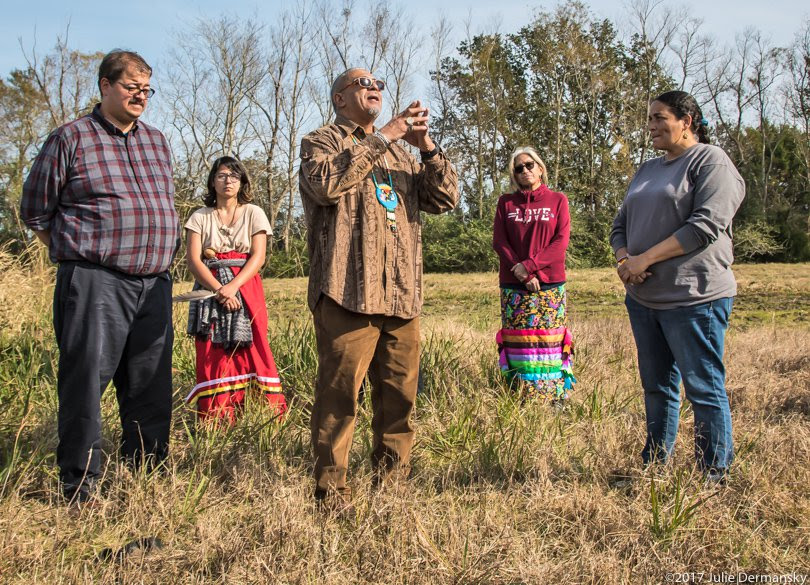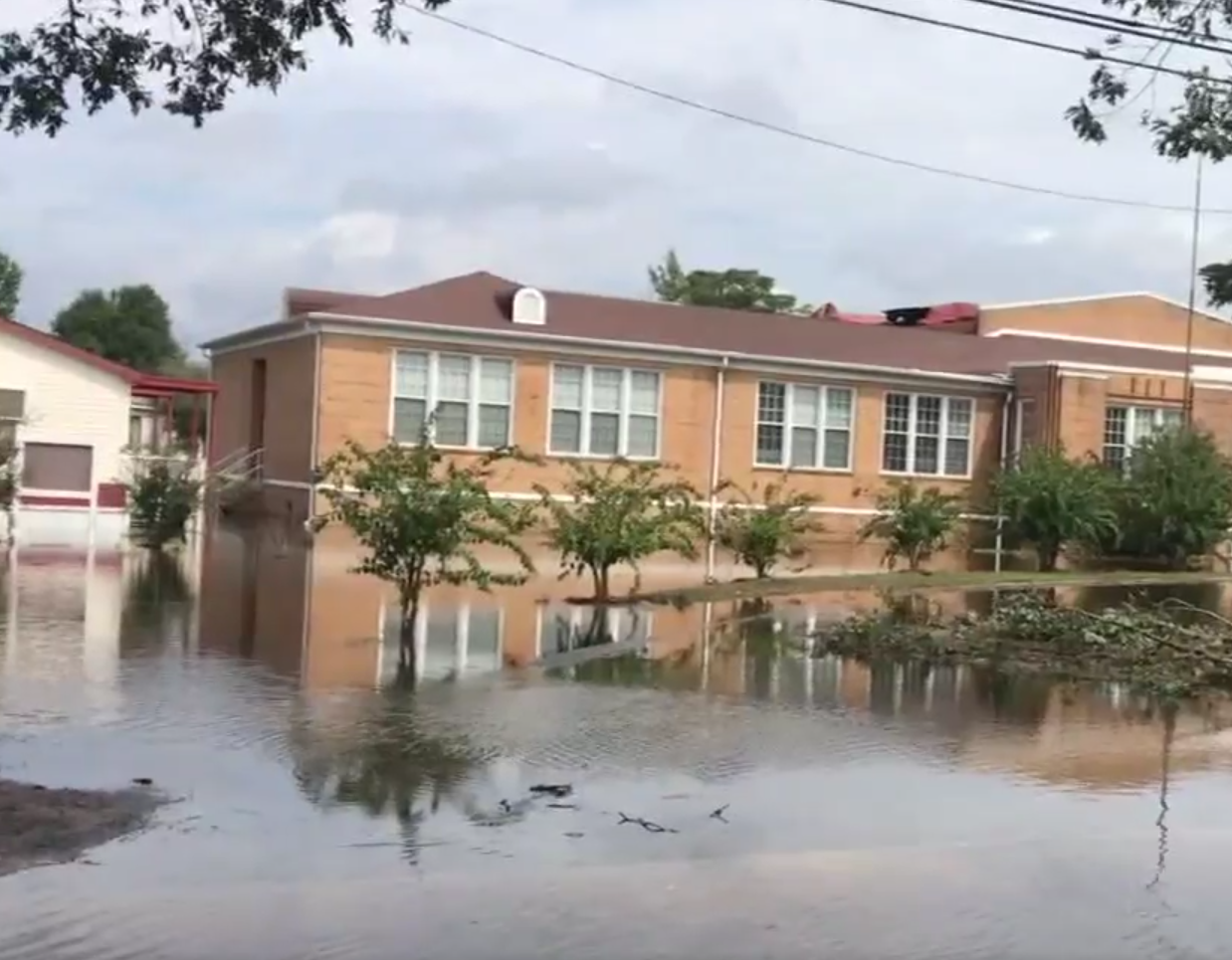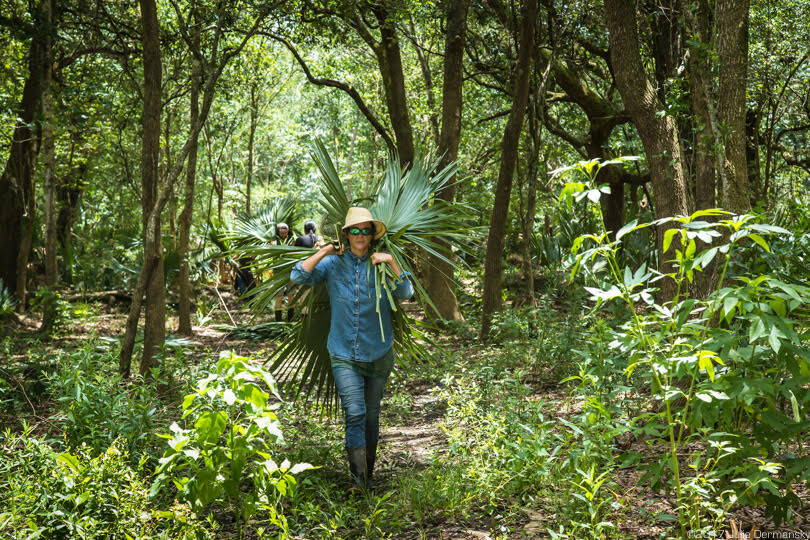As Thanksgiving celebrations kick off around the U.S., activists are calling attention to Indigenous organizations, including many that work on problems and issues related to climate change.
“A lot of people have been asking me lately how to support Indigenous people during this holiday season which often harps on celebration of the genocide of our ancestors,” wrote community advocate Amy Breesman in a social media posting on Wednesday.
“For starters, always be mindful of [whose] land you’re on and acknowledge and respect those Nations,” she wrote, and then consider making a donation to an Indigenous community organization or “reallocate some of your Thanksgiving meal funds to Indigenous initiatives.”
In light of this Thanksgiving holiday, DeSmog examines a tiny handful of front-line organizations and efforts — by no means a comprehensive or complete list — connecting climate change and Indigenous communities.
Hurricane Florence Response
In the Carolinas, cleanup continues from Hurricane Florence, which struck the East Coast in mid-September and dumped more than 30 inches of rain in some places.
In September, scientists from the Lawrence Berkeley National Laboratory, Stony Brook University, and the National Center for Atmospheric Research predicted that rainfall from Hurricane Florence would be 50 percent worse because of climate change.
Those predictions were borne out in catastrophic flooding that killed 53 people, caused authorities to order over a million people to evacuate and caused spills of coal ash, sewage, and animal waste from Concentrated Animal Feeding Operations (CAFOs).
Among those impacted by Florence were the Coharie, Lumbee, and Waccamaw Siouan tribal communities in southeastern North Carolina.
“A lot of people haven’t recovered from Matthew, next week they may not even have a home,” Harold Collins, a member of the Lumbee Tribe from Lumberton, North Carolina told the Washington Post as Hurricane Florence loomed.
The roof of the Lumbee’s Indian Education Resource Center was blown off by Florence’s winds, according to an ABC News affiliate, and relentless rain poured inside during the storm, but locals managed to save the center’s historical artifacts.
Floodwaters surround the Indian Education Resource Center in Robeson County, North Carolina following Hurricane Florence. Credit: ABC News 11 video screenshot.
“Florence didn’t just bring wind and rains,” Rita Locklear, the center’s former director told ABC News. “It’s ruined lives.”
Information about how climate change impacts Indigenous communities has become more difficult to access under the Trump administration. A U.S. Environmental Protection Agency (EPA) website on climate change — removed in 2017 — previously conveyed information about the particular risks that climate change poses to Indigenous communities.
“Indigenous groups in various regions — such as the United States, Latin and South America, Europe, and Africa — are already experiencing threats to their traditional livelihoods,” the EPA site previously said. “Rising sea levels and extreme events threaten native groups that inhabit low-lying island nations. Higher temperatures and reduced snow, ice, and permafrost threaten groups that live in mountainous and polar areas.”
Under the Trump administration, that EPA website went dark for over a year. In place of the page previously labeled “Climate Change Impacts” is a description of “Climate Change Indicators” that concludes developing ways to measure the impacts of climate change on people’s health “is challenging and still emerging.” (Christine Todd Whitman, George W. Bush’s EPA Administrator told Time Magazine in March that the EPA’s climate site was edited “to such an extreme degree that [it] undermines the credibility of the site.”)
Pipeline Pushback
Organizations with Indigenous leadership have been calling attention to those concerns, whether documented on the EPA website or not, and mobilizing opposition to oil and gas pipeline projects.
“Climate change makes the challenges we are already facing that much worse — political and economic marginalization, loss of land and resources, human rights violations, discrimination, and lack of access to health care, education, and employment, etc.,” Stop Line 3, which opposes a $7.5 billion Enbridge crude oil pipeline project stretching from Alberta to Minnesota, says on its issues page. “Across the globe, Indigenous people are the most impacted by climate change and the problems it is causing, even though they contribute relatively little to the emissions that are causing it.”
On Monday, the Line 3 replacement project moved forward as the Minnesota Public Utilities Commission rejected requests from tribes, environmental organizations, and the Minnesota Department of Commerce to reconsider its support for the project.
In the Bayou
Some of the opponents to the Bayou Bridge pipeline in Louisiana include an organization that, like the Dakota Access pipeline opponents before it, rejects the title of “protester” and instead describes itself as an organization of “water protectors.”
The L’eau Est La Vie (Water Is Life) camp, which briefly shut down construction of the Bayou Bridge pipeline (BBP) at various times over the course of the project, has played a large role in opposing the pipeline.
“BBP is the tail end of the Dakota Access Pipeline that weaves from the Bakken to the fragile wetlands of Southern Louisiana,” the Indigenous Environmental Network said in a statement when the camp was announced. “Once again Indigenous communities are being put in harm’s way and over 700 bodies of water will be threatened by one of the worst environmental offenders known to date. We stand with the Water Protectors here in southern Louisiana to protect these critical wetlands that serve as protection for the people of this region from floods and storms.”
Monique Michelle Verdin, along with other water protectors from North Dakota and Cherri Foytlin, one of the founders of L’eau Est La Vie Camp, gathering supplies for the camp. ©2017 Julie Dermansky
The concerns that many oil and gas pipeline opponents cite are not only about climate change. “Over 300,000 people depend on the Bayou Lafourche, for their drinking water in the heart of Houma territory,” added Monique Verdin, councilwoman of the Houma Nation.
And while much of the focus Thanksgiving Day might revolve around the food on American plates, it’s also worth remembering the full history of the holiday — as well as the humble glass of drinking water next to that plate.
Main image: Principal Chief Edward Chretien Jr. of the Atakapa-Ishak Nation giving his blessing for the land to be used by L’eau Est La Vie Camp to continue protecting water from the Bayou Bridge pipeline. Credit: ©2017 Julie Dermansky
Subscribe to our newsletter
Stay up to date with DeSmog news and alerts








